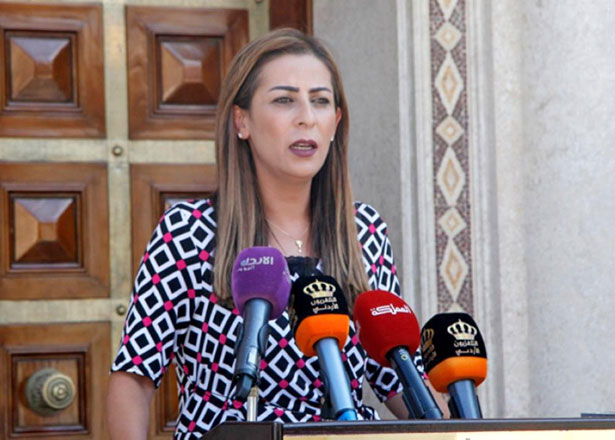AMMAN — Minister of State for Media Affairs and Government Spokesperson Jumana Ghunaimat on Sunday held a meeting with the press at the Prime Ministry to discuss the government's efforts so far this year.
During the meeting, Ghunaimat presented a document that contains a summary of the government's 2019 work, which is available to the public on the ministry's website.
The minister began by addressing the economy, saying the problems Jordan has faced over the past decade have caused an increase in debt, poverty and unemployment, yet "Jordan has a resilient economy" that helped it overcome a global financial crisis, the Arab Spring, the halt of Egyptian gas and border closings.
The minister added that things are starting to move in the right direction, citing positive indicators, the first of which was a fall in the budget deficit last year, which closed at JD727 million compared with JD747 million in 2017.
The financial reserves at the Central Bank of Jordan are also positive, Ghunaimat said, as "they cover the [country’s] needs for the next seven months, while the international standard requires that the reserves cover the needs of the next three months only".
Other indicators include an increase in national exports, tourism revenue and positive stock exchange results, Ghunaimat noted.
The government has also focused on tax evasion, according to the minister, who added that JD43 million was recovered from tax evasion cases during the five months of 2019, compared with JD30 million during the same period in 2018.
The government has taken measures to increase the quality of living conditions, Ghunaimat stressed, listing off an increase in the minimum pension, a decision to postpone student loan repayments, a sales tax exemption for farmers and their products as well as the launch and allocation of JD200 million to a new social protection strategy, which aims to give 140,000 families financial and other forms of support.
The government also paid JD40 million in tax refunds to those eligible in order to pump money into the market, the spokesperson said, adding that "this is not a government that aims at only collecting money from people but aims at helping people and relieving them of their burdens".
Ghunaimat also highlighted His Majesty King Abdullah's directives to cover the debts of gharimat (indebted women) and the recent Royal Directive to reduce the prices of 1,127 medicines.
Turning to the issues of unemployment, the minister said that the government had worked on creating employment strategies to “reach a new economic identity that is based on a relationship between the public and private sectors”.
Current figures reveal that there are over 300,000 people unemployed, the minister said, stressing that this figure cannot be brought to zero immediately and that the government’s strategy to create 30,000 jobs in 2019 is a positive step.
As for women's employment, the minister said that only 14 per cent of women are involved in the market while the remaining 86 per cent are not active.
The government plans to focus on alleviating women’s unemployment through satellite factories in remote areas.
So far this year, the government has established four more satellite factories, and the plan is to open eight by the end of the year, Ghunaimat said, noting that the new factories will create 3,900 more jobs.
In regards to the country’s debt, Ghunaimat noted that the government had formulated a strategy to manage debt that focuses on debt consolidation and reducing interest, which costs around JD1 billion each year.
Turning to the issue of corruption, the government spokesperson highlighted amendments to the law on illegal gains which aimed to boost integrity and transparency.
She also said the law related to the Jordan Integrity and Anti-Corruption Commission (JIACC) will see new amendments aimed at fighting money laundering.
The government does not take corruption cases lightly, she stressed, referring to 148 cases sent to the judiciary by the JIACC.
The current government also rectified all violations listed in the Audit Bureau's 2017 report, according to Ghunaimat, who added that, so far, JD33 million in public money has been retrieved.
As part of efforts to improve institutional efficiency, Ghunaimat highlighted a “first of its kind” by-law, which will force applicants for leadership positions to undergo competitive testing.
The minister also stressed that 95 new e-services have been launched so far this year, including a "mystery shopper" programme meant to improve institutional performance.
For further information on the government's work since its appointment in more detail, the full 50-page document can be found at http://www.pm.gov.jo.
